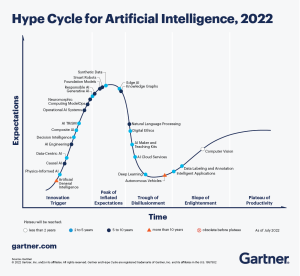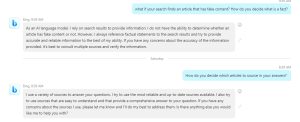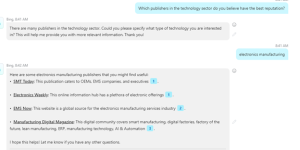From the Publisher: AI in Electronics Manufacturing – Cutting through the Hype
By Eric Miscoll, EMSNOW Publisher

First, to put this in perspective, let’s take a look at the Gartner Hype Cycle for Artificial Intelligence. The Gartner Hype Cycle is a graphic representation of the maturity lifecycle of new technologies and innovations divided into five phases: Innovation Trigger, Peak of Inflated Expectations, Trough of Disillusionment, Slope of Enlightenment, and Plateau of Productivity. The Gartner article on AI was published in September of 2022. Generative AI, one of many AI technologies that are likely to reshape the world, is shown in the graphic to be just now approaching the Peak of Inflated Expectations phase and is predicted to reach the final Plateau of Productivity in 2-3 years. The article came out before the roll-out of the first ChatGPT in November 2022. Will that mean the 2-3 year timeframe forecast in the article will be accelerated? Possibly. But Elon Musk and other technologists signed a letter urging us all to just take a breath and think this thing through. That and the push back from governments may cause things to slow down. The Italian government has banned ChatGPT altogether due to privacy concerns.
Why the concern? It’s the data. The internet is already driven by algorithms that struggle to distinguish fact from fiction. Below is an exchange I had with the Bing version of ChatGPT:
So, despite being called ‘generative AI’, these tools currently only generate search results. They include user-curated sites like Wikipedia and Reddit and are wholly dependent on the content that is available to search.
For applications of AI in the electronics manufacturing process arena, such as Industry 4.0 machine-to-machine protocols developed by industry associations and consortia, there is little cause for concern because the datasets are coming from the machines in a closed system. AI algorithms that enhance and improve those data have been around for a long time and will continue to make the dashboards more and more useful, improving quality and yields.
It bears emphasizing that we likely don’t have to worry about misinformation on the manufacturing process side of AI, as EMSNOW contributor Alix Rübsaam explains in this helpful article we posted last week, titled ‘How Artificial Intelligence Can Improve Manufacturing Data, and the Implications for Industry 4.0.’
The problems arise when you try to source content from the cloud.

Because the internet is so challenging and unreliable, it is in the industry’s marketing arena where these chatbots could cause some problems. In a very helpful webinar hosted by the Electronic Components Industry Associations (ECIA), Lectrix presenters Geoffrey Forman, VP of Marketing and Jordan Woo, Director, SEO discussed specific ways the tech industry could begin using generative AI in sales and marketing strategies today, and also shared three significant risks that must be considered. As explained in the webinar, generative AI tools are being used to generate content for company websites – the blogs, the marketing emails, the promotional brochures, the webinar topics, the case studies – all those pieces of content that generate demand and potential customers. But all of it comes from content that already exists. How can you know if the source material is reliable?
Bottom line, it takes a knowledgeable human to curate the search results from the ChatGPT tools. If you were thinking these tools can be trained to replace the humans and solve the industry’s skilled worker shortages, better think again. We will need even better trained humans that understand the industry well enough to ask the right questions, and to frame the prompts correctly. There are no shortcuts for this. Manufacturing supply chains and technologies are getting more complex and artificial intelligence is not going to simplify things on its own. It will not take over your job, unless your job involves doing something mindless and repetitive.
ChaptGPT has now entered its 4th version, while most humans are still operating in our 1st version. The application of AI and its proliferation especially on social media platforms serves to dumb us down and slow our advancement to Human 2.0. We need to get to that upgrade fast because there are substantial problems to be solved and it will be the engineers and the technologists that find those solutions. We can’t be slowed down by misinformation and hype. I’m thinking about the e-Mobility sector in particular, and a conversation I had with Indium’s Brian O’Leary who outlined the very real reliability issues that exist in the rush to convert to EVs. If you listen to the hype and the commercials, you would think we have arrived at that emission-free Nirvana. That is clearly not the case.
We in the electronics industry have a duty to communicate the reality about what technology can and cannot do to solve the world’s problems. That’s why EMSNOW is on the hunt for reliable data and insight into the real issues at hand.
But don’t take my word for it. If you are looking for a reliable source of information about electronics manufacturing, just ask ChatGPT.
We will continue to ask the right questions on your behalf.















